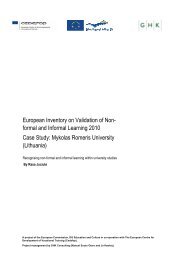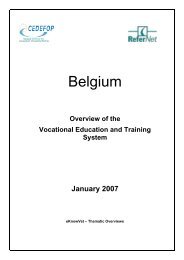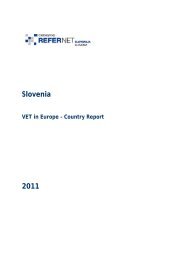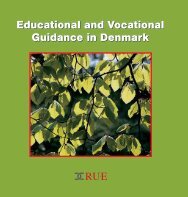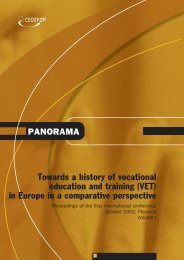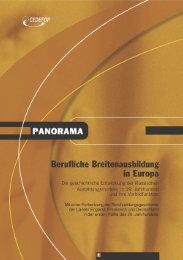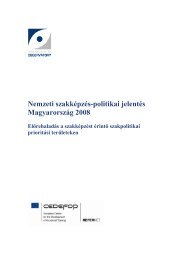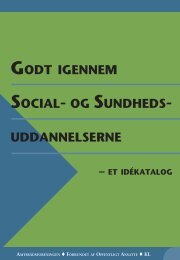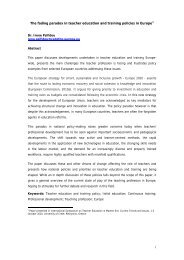PROFF – Professionalisation of VET teachers for the future - Europa
PROFF – Professionalisation of VET teachers for the future - Europa
PROFF – Professionalisation of VET teachers for the future - Europa
You also want an ePaper? Increase the reach of your titles
YUMPU automatically turns print PDFs into web optimized ePapers that Google loves.
4. Telkkä, development <strong>of</strong> education and training evolving from working life, FinlandThe <strong>VET</strong> re<strong>for</strong>m in Finland in <strong>the</strong> late 1990s placed huge demands on <strong>VET</strong> <strong>teachers</strong>: <strong>the</strong>y areexpected to enable <strong>the</strong>ir pupils to acquire <strong>the</strong> skills needed <strong>for</strong> working life and lifelonglearning as well as developing and maintaining cooperation between <strong>VET</strong> and working life.Upper secondary vocational qualifications were re<strong>for</strong>med from 1999 to 2001. All degreesinclude a minimum <strong>of</strong> six months <strong>of</strong> on-<strong>the</strong>-job learning. Also skills demonstrations to proveachievement <strong>of</strong> <strong>the</strong> objectives <strong>of</strong> vocational studies will be included in all upper secondaryvocational education and training by 2005. These skills demonstrations are planned andorganised in cooperation with businesses and o<strong>the</strong>r representatives <strong>of</strong> working life.The aim <strong>of</strong> <strong>the</strong> Telkkä programme is to:• develop <strong>VET</strong> to respond better to <strong>the</strong> needs <strong>of</strong> working life;• update <strong>teachers</strong>’ vocational skills;• develop a model <strong>for</strong> developing <strong>VET</strong> through <strong>teachers</strong>’ on-<strong>the</strong>-job periods;• train workplace instructors (by <strong>teachers</strong> in training).The programme is structured as follows:(a) distance work: pedagogical aspects <strong>of</strong> <strong>VET</strong>;(b) seminar: brief <strong>for</strong> <strong>teachers</strong> <strong>for</strong> training workplace instructors;(c) planning <strong>the</strong> OJL period;(d) two months on-<strong>the</strong>-job: <strong>for</strong>ming pairs <strong>of</strong> teacher plus ‘worker’ and training one to twoworkplace instructors;(e) feedback <strong>–</strong> reporting by teacher and workplace;(f) syn<strong>the</strong>sis and analysis;(g) training model, best practice, materials.Telkkä from a participant’s perspective:Jaana trained originally as a teacher <strong>of</strong> home economics but later complemented her trainingwith a bachelor’s degree in <strong>the</strong> field. She has also completed <strong>the</strong> diploma <strong>of</strong>näyttötutkintomestari (expert on competence-based qualifications). She took part in Telkkä toget a pr<strong>of</strong>essional update (e.g. dishes, raw materials, methods, different types <strong>of</strong> catering,insight into working life routines and understanding <strong>the</strong> pr<strong>of</strong>essional pr<strong>of</strong>iles in catering).During training Jaana felt particularly happy about testing <strong>the</strong> assignments that will eventuallybe given to students, i.e. is <strong>the</strong> scope <strong>of</strong> <strong>the</strong> assignment OK, up to date, relevant and realisticto require a learning diary? Also personal experience <strong>of</strong> daily life in a catering business will50



